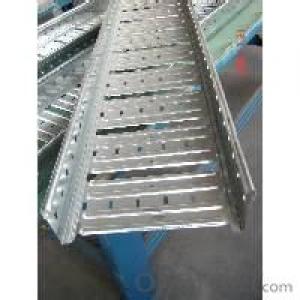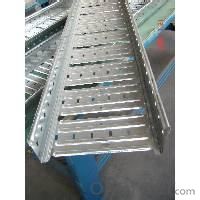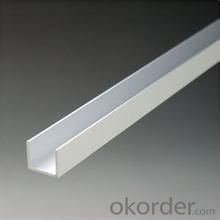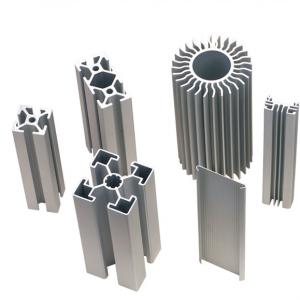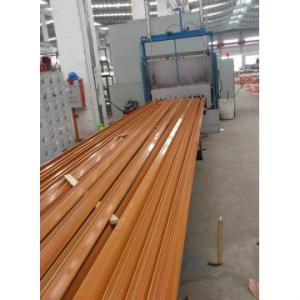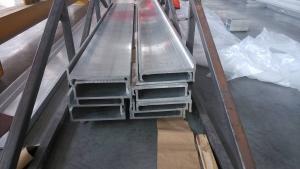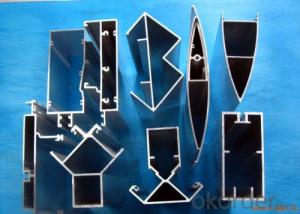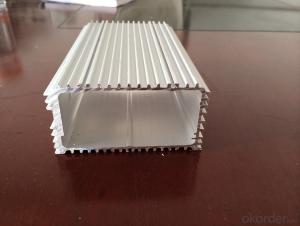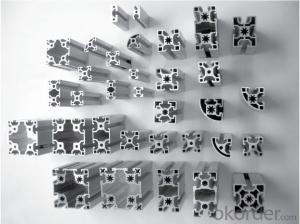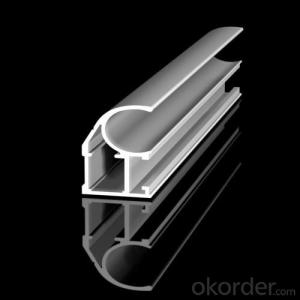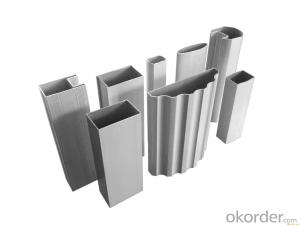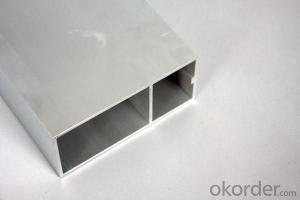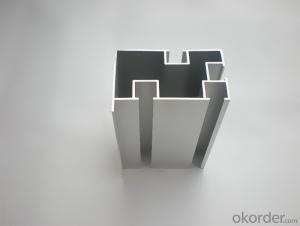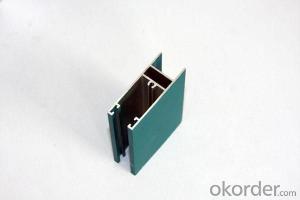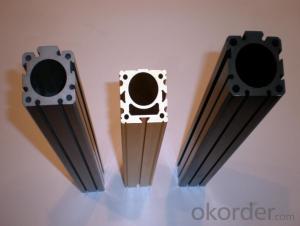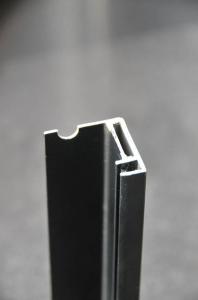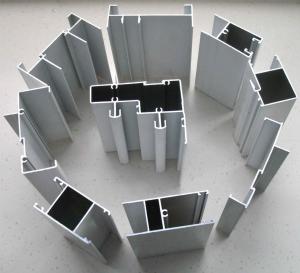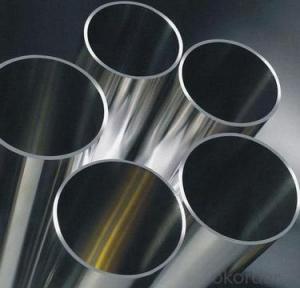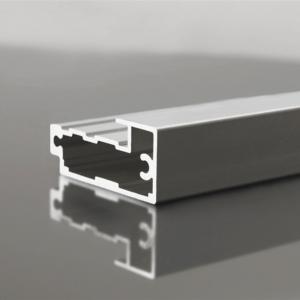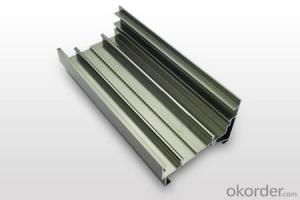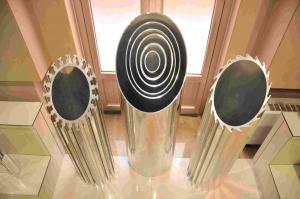Aluminum Extrusion Profiles T-Slot for Windows and Doors or Construction
- Loading Port:
- Shanghai
- Payment Terms:
- TT OR LC
- Min Order Qty:
- 1 m.t.
- Supply Capability:
- 1000 m.t./month
OKorder Service Pledge
OKorder Financial Service
You Might Also Like
Aluminium is a relatively soft, durable, lightweight, ductile and malleable metal with appearance ranging from silvery to dull gray, depending on the surface roughness. It is nonmagnetic and does not easily ignite. A fresh film of aluminium serves as a good reflector (approximately 92%) of visible light and an excellent reflector (as much as 98%) of medium and far infrared radiation. The yield strength of pure aluminium is 7–11 MPa, while aluminium alloys have yield strengths ranging from 200 MPa to 600 MPa. Aluminium has about one-third the density and stiffness of steel. It is easily machined, cast, drawn and extruded.
Aluminium alloys (or aluminum alloys; see spelling differences) are alloys in which aluminium (Al) is the predominant metal. The typical alloying elements are copper, magnesium, manganese, silicon, tin and zinc. There are two principal classifications, namely casting alloys and wrought alloys, both of which are further subdivided into the categories heat-treatable and non-heat-treatable.
Material | Alloy 6063,6061,6005or according to customer’s choice |
Temper | T3, T4, T5, T6 |
Surface | Anodize, electrophoresis, powder coating, PVDF coating, wood grain painting, matted, etc. |
Length | Coating 6.5 meters, Anodizing 6.5 meters, Mill finish 5-6 meters |
Application | Industrial, electrical equipment(TV set, air conditioner, refrigerator, computer), decoration,construction, transportation |
Custom Made | We can package following with customer's request. |
Products are exported to United States, Canada, U.A.E, Brazil, Mexico,Thailand, Vietnam, Nigeria etc, over 100 countries and regions all over the world.
FAQ:
1. What is the form of payment?
Normally 30% TT, L/C
2. Type of quotation?
FOB, CFR, CIF
3. Port of loading?
Shanghai port
4. Delivery time?
20 day after client’s deposit
- Q: Aluminum profile connecting piece
- Very little to buy this alone, and only with industrial aluminum suppliers. - selling on Taobao is also a way if the price is appropriate.
- Q: Can aluminum profiles be used in window and door manufacturing?
- Yes, aluminum profiles can be used in window and door manufacturing. Aluminum is a popular choice for window and door frames due to its durability, strength, and corrosion resistance. It provides excellent structural integrity while allowing for sleek and modern designs. Additionally, aluminum profiles can be easily customized and come in a variety of finishes, making them a versatile option for window and door manufacturers.
- Q: How do aluminum profiles contribute to LEED certification?
- Aluminum profiles can contribute to LEED (Leadership in Energy and Environmental Design) certification in several ways. Firstly, aluminum is a highly sustainable material. It is one of the most abundant elements on Earth and can be easily recycled without losing its quality. Using aluminum profiles in construction projects reduces the demand for new raw materials, conserves energy, and minimizes greenhouse gas emissions. This aligns with LEED's focus on reducing the environmental impact of buildings. Additionally, aluminum profiles are lightweight yet durable, allowing for efficient transportation and installation. This can contribute to LEED points in the category of Sustainable Sites, which encourages the use of materials and techniques that minimize impacts on ecosystems and reduce pollution during construction. Furthermore, aluminum profiles can be used to improve energy efficiency in buildings. By incorporating thermal breaks and insulation, aluminum profiles can help prevent heat transfer and reduce energy consumption for heating or cooling. This can contribute to LEED points in the Energy and Atmosphere category, which promotes the use of energy-efficient systems and materials. Moreover, aluminum profiles are resistant to corrosion and require minimal maintenance over their lifespan. This durability can contribute to LEED points in the Materials and Resources category, which encourages the use of long-lasting, low-maintenance materials that minimize waste and the need for replacement. In conclusion, aluminum profiles contribute to LEED certification by promoting sustainability, reducing environmental impacts, improving energy efficiency, and enhancing the durability of buildings. By considering the use of aluminum profiles in construction projects, designers and builders can achieve LEED credits and contribute to a more sustainable future.
- Q: Can aluminum profiles be used in automotive applications?
- Yes, aluminum profiles can be used in automotive applications. Aluminum profiles are lightweight, strong, and corrosion-resistant, making them suitable for various automotive components such as body panels, chassis parts, and engine components. Their use helps reduce the overall weight of the vehicle, improving fuel efficiency and performance.
- Q: This question asks if aluminum profiles can be utilized in the construction or design of interior wall systems.
- <p>Yes, aluminum profiles are commonly used for interior wall systems. They offer numerous benefits such as durability, lightweight, and resistance to corrosion. These profiles can be used in various applications, including partition walls, decorative panels, and structural supports. Their versatility allows for a wide range of design possibilities, and they are easy to install and maintain, making them a popular choice in modern interior design and construction.</p>
- Q: How do aluminum profiles perform in vibration isolation applications?
- Aluminum profiles are highly effective in vibration isolation applications due to their unique properties and characteristics. The use of aluminum profiles in such applications helps to minimize and dampen vibrations, creating a stable and isolated environment. One of the primary reasons for the effectiveness of aluminum profiles in vibration isolation is their high strength-to-weight ratio. Aluminum is a lightweight material, which allows for the construction of structures that can effectively absorb and dissipate vibrations. This lightweight nature ensures that the profiles do not add excessive weight to the system, as added weight can amplify vibrations rather than dampen them. Additionally, aluminum profiles have excellent damping capabilities. Damping refers to the ability of a material to absorb and dissipate energy from vibrations. Aluminum possesses inherent damping properties, which significantly contribute to reducing vibration levels. This ensures that the profiles effectively isolate vibrations and prevent their transmission to other components or structures. Furthermore, aluminum profiles can be easily customized and designed to meet specific vibration isolation requirements. They can be engineered to have specific geometries and configurations, allowing for the creation of structures that effectively attenuate vibrations. This flexibility in design enables the optimization of the profiles for different applications and environments, ensuring maximum effectiveness in vibration isolation. Moreover, aluminum profiles offer good corrosion resistance, which is crucial in vibration isolation applications that may be exposed to harsh operating conditions. This corrosion resistance ensures the longevity and reliability of the profiles, maintaining their performance over extended periods. In summary, aluminum profiles are highly suitable for vibration isolation applications due to their lightweight nature, excellent damping capabilities, customization options, and corrosion resistance. Through their effective vibration absorption and dissipation properties, aluminum profiles help to create stable and isolated environments, minimizing the impact of vibrations on surrounding components or structures.
- Q: What screws do you use for aluminum alloy profiles?
- Aluminum alloy profiles are generally: with electric nails, self tapping screws fixed. Do not use ordinary screws, tools should also be chosen.Self tapping screws are used for non metal or soft metal, without backing holes and tapping; self tapping screws are pointed, so that they can be self tapping; ordinary screws are flat head, and the thickness is the same.Classification of aluminium alloy sections by use:Construction aluminum profiles (divided into two types of doors and windows and curtain wall).Radiator aluminum profile.General industrial aluminum: mainly used in the manufacture of industrial production, such as automation equipment, covering the skeleton and the custom mold machinery and equipment according to their own requirements, such as assembly line conveyor belt, hoisting machine, glue machine, testing equipment, shelves and so on, electronic machinery industry and clean room with.Aluminum alloy profile of railway vehicle structure: mainly used for rail vehicle body manufacturing.
- Q: What are the aluminum profile manufacturers in Jiangsu?
- How to choose the industrial aluminum profiles, this problem for the just contact with industrial aluminum profile friends, is really a serious problem to consider.That selection of industrial aluminum manufacturers is not good, money, goods is not good, he can give you redo is OK, but also take time; meet industrial aluminum manufacturers some black, and you may be wrangling, that egg pain.
- Q: Is it possible to use aluminum profiles for outdoor applications like fences and railings?
- <p>Yes, aluminum profiles are commonly used for outdoor applications such as fences and railings. They are favored for their resistance to corrosion, lightweight properties, and durability. Aluminum can withstand harsh weather conditions without rusting, making it an ideal material for outdoor use. Additionally, it is low maintenance, as it does not require painting or frequent repairs. The profiles can be powder-coated or anodized for enhanced protection and aesthetic appeal.</p>
- Q: Are aluminum profiles suitable for use in the marine industry?
- Yes, aluminum profiles are suitable for use in the marine industry. Aluminum has several properties that make it an excellent material for marine applications. Firstly, aluminum is lightweight yet durable, which is essential for constructing boats and other marine vessels. Its lightweight nature allows for faster speeds and better fuel efficiency. Additionally, aluminum is corrosion-resistant, making it ideal for withstanding the harsh and corrosive marine environment. This property eliminates the need for frequent maintenance and increases the lifespan of marine structures. Furthermore, aluminum has excellent thermal conductivity, which helps dissipate heat quickly, reducing the risk of overheating in marine engines. Lastly, aluminum is highly malleable and can be easily formed into various shapes and profiles, allowing for versatility in design and construction. Overall, the use of aluminum profiles in the marine industry ensures a combination of strength, durability, corrosion resistance, and lightweight properties, making it a suitable choice for marine applications.
Send your message to us
Aluminum Extrusion Profiles T-Slot for Windows and Doors or Construction
- Loading Port:
- Shanghai
- Payment Terms:
- TT OR LC
- Min Order Qty:
- 1 m.t.
- Supply Capability:
- 1000 m.t./month
OKorder Service Pledge
OKorder Financial Service
Similar products
Hot products
Hot Searches
Related keywords
